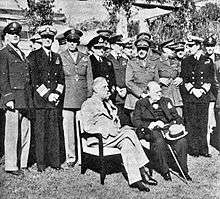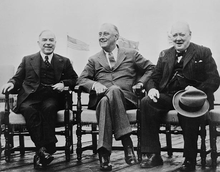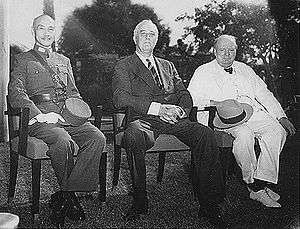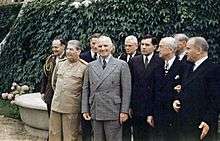List of World War II conferences
This is a list of World War II conferences of the Allies of World War II. Conference names in boldface indicate the conferences at which the leaders of the United States, the United Kingdom, and the Soviet Union were all present. For the historical context see Diplomatic history of World War II.
| Name (CODE NAME) |
Location | Dates | Major participants: | Major results |
|---|---|---|---|---|
| U.S.-British Staff Conference (ABC-1) |
Washington, D.C. | January 29 – March 27, 1941 | American, British, and Canadian military staff | Set the basic planning agreement for the U.S. to enter the war |
| Atlantic Conference (RIVIERA) |
Argentia, Newfoundland | August 9 – 12, 1941 | Churchill, Roosevelt, Hopkins | Atlantic Charter, proposal for a Soviet aid conference |
| First Moscow Conference | Moscow, USSR | September 29 – October 1, 1941 | Stalin, Harriman, Beaverbrook, Molotov | Allied aid to the Soviet Union |
| First Washington Conference (ARCADIA) |
Washington, D.C. | December 22, 1941 – January 14, 1942 | Churchill, Roosevelt | Europe first, Declaration by United Nations |
| Second Washington Conference | Washington, D.C. | June 20 – 25, 1942 | Churchill, Roosevelt | Make first priority opening a 2nd front in North African Campaign before cross-English channel invasion |
| Second Moscow Conference | Moscow, USSR | August 12 – 17, 1942 | Churchill, Stalin, Harriman | Discuss reasons for North African Campaign over cross-channel invasion, Anglo-Soviet pact on information and technological exchanges |
| Cherchell Conference | Cherchell, Algeria | October 21 – 22, 1942 | American General Clark, and Vichy French officers including Charles Mast | A clandestine conference before the Operation Torch landings, in which some Vichy French commanders agreed not to resist the Allied landings in Morocco and Algeria[1] |
| Casablanca Conference (SYMBOL) |
Casablanca, Morocco | January 14 – 24, 1943 | Churchill, Roosevelt, Charles de Gaulle, Henri Giraud | Plan Italian Campaign, plan cross-channel invasion in 1944, declaration of "unconditional surrender" of Axis, incitement to unify French fighting authorities of London and Algiers |
| Third Washington Conference (TRIDENT) |
Washington, D.C. | May 12 – 25, 1943 | Churchill, Roosevelt, Marshall | Plan Italian Campaign, increase air attacks on Germany, increase war in Pacific |
| Quebec Conference (QUADRANT) |
Quebec, Canada | August 17 – 24, 1943 | Churchill, Roosevelt, King | D-Day set for 1944, reorganization of South East Asia Command, secret Quebec Agreement to limit sharing nuclear energy info |
| Third Moscow Conference | Moscow, USSR | October 18 – November 1, 1943 | Foreign ministers Hull, Eden, Molotov, Fu and Stalin | Moscow Declaration |
| Cairo Conference (SEXTANT) |
Cairo, Egypt | November 23 – 26, 1943 | Churchill, Roosevelt, Chiang Kai-shek | Cairo Declaration for postwar Asia |
| Tehran Conference (EUREKA) |
Tehran, Iran | November 28 – December 1, 1943 | Churchill, Roosevelt, Stalin | First meeting of the Big 3, plan the final strategy for the war against Nazi Germany and its allies, set date for Operation Overlord |
| Second Cairo Conference |
Cairo, Egypt | December 4 – 6, 1943 | Churchill, Roosevelt, İnönü | Agreement to complete Allied air bases in Turkey, postpone Operation Anakim against Japan in Burma. |
| British Commonwealth Prime Ministers' Conference | London, England | May 1–16, 1944 | Churchill, John Curtin (Australia), Peter Fraser (New Zealand), William Lyon Mackenzie King (Canada) and General Jan Smuts (South Africa). | British Commonwealth leaders support Moscow Declaration and reach agreement regarding their respective roles in the overall Allied war effort. |
| Bretton Woods conference | Bretton Woods, USA | July 1 – 15, 1944 | Representatives of 44 nations | Establishes International Monetary Fund and International Bank for Reconstruction and Development |
| Dumbarton Oaks Conference | Washington, D.C. | August 21 – 29, 1944 | Sir Alexander Cadogan, Andrei Gromyko, Edward Reilly Stettinius, Jr. and Ku Wei-chün | Agreement to establish the United Nations |
| Second Quebec Conference (OCTAGON) |
Quebec, Canada | September 12 – 16, 1944 | Churchill, Roosevelt, | Morgenthau Plan for postwar Germany, other war plans, Hyde Park Agreement |
| Fourth Moscow Conference (TOLSTOY) |
Moscow, USSR | October 9 – 18, 1944 | Churchill, Stalin, Molotov, Eden | Establishing post-war spheres of influence in Eastern Europe, Balkan peninsula |
| Malta Conference (ARGONAUT & CRICKET) |
Malta | January 30 – February 2, 1945 | Churchill, Roosevelt | Preparation for Yalta |
| Yalta Conference (ARGONAUT & MAGNETO) |
Yalta, USSR | February 4 – 11, 1945 | Churchill, Roosevelt, Stalin | Final plans for defeat of Germany, postwar Europe plans, set date for United Nations Conference, conditions for the Soviet Union's entry in war against Japan |
| United Nations Conference on International Organization | San Francisco, USA | April 25 – June 26, 1945 | Representatives of 50 nations | United Nations Charter |
| Potsdam Conference (TERMINAL) |
Potsdam, Germany | July 17 – August 2, 1945 | Stalin, Truman, Attlee | Potsdam Declaration for unconditional surrender of Japan, Potsdam Agreement on policy for Germany |
In total Churchill attended 16 meetings, Roosevelt 12, Stalin 7.
Code names for some of the major wartime conference meetings involving Roosevelt and later Truman had a partial naming sequence referring to devices or instruments which had an ordinal number as part of their meaning referring to the number of the meeting: 1 ARCADIA, 2 SYMBOL, 3 TRIDENT, 4 QUADRANT, 5 (none), 6 SEXTANT, 7 EUREKA, 8 OCTAGON, 9 ARGONAUT (CRICKET & MAGNETO), 10 and last TERMINAL.
 Atlantic Conference, Argentia, Dominion of Newfoundland, 1941
Atlantic Conference, Argentia, Dominion of Newfoundland, 1941 Casablanca Conference, Casablanca, Morocco, 1943
Casablanca Conference, Casablanca, Morocco, 1943 First Quebec Conference Quebec City, Canada, 1943
First Quebec Conference Quebec City, Canada, 1943 Cairo Conference, Cairo, Egypt, 1943
Cairo Conference, Cairo, Egypt, 1943 Tehran Conference, Tehran, Iran, 1943
Tehran Conference, Tehran, Iran, 1943 Second Cairo Conference, Cairo, Egypt, 1943
Second Cairo Conference, Cairo, Egypt, 1943 Yalta Conference, Yalta, USSR, 1945
Yalta Conference, Yalta, USSR, 1945 Potsdam Conference, Potsdam, Germany, 1945
Potsdam Conference, Potsdam, Germany, 1945
Notes and references
Further reading
- What major conferences were held during World War II?, website of the Franklin D. Roosevelt Presidential Library
- United States Army Center of Military History
